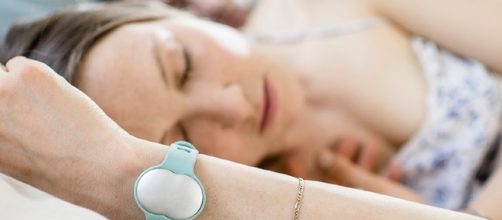In a recent video, CNBC noted that, for women from all walks of life, "getting pregnant can be difficult." The video featured Breanna Johnson, who had been attempting to conceive for months, with no success. Ms. Johnson described her discovery that, even for those without serious fertility issues, conceiving is "not an easy process." CNBC describes the Ava fertility bracelet as a possible solution for women and couples who find themselves in Breanna Johnson's situation.
Touted as the "first" wearable fertility-tracking device, the Ava bracelet, which is said to retail for $199, is only worn at night, while its user is sleeping.
Using Bluetooth technology, the fertility bracelet communicates with an Ava smartphone app. Ava Sciences is said to have attracted $12.3 million in venture funding, as reported by Crunchbase.
'Fitbit-for-fertility' bracelet predicts most-likely conception dates
The bracelet is said to monitor "nine biological parameters," which the app works with to "hone in on" cycles. A woman's sleeping pattern, heart rate, and body temperature are said to be among the metrics tracked by the fertility bracelet, allowing the technology to monitor hormonal changes, and predict the most likely times users might expect to become pregnant.
Lea Von Bidder, the co-founder and CEO of Ava Sciences, spoke about how most women in the 21st century are using methods relied upon by their mothers to track their ovulation cycles, describing the "lack of innovation" as "shocking." The CEO said that "urine sticks" are "unfriendly" and "messy," and that the temperature method is challenging for most women, because of the discipline required to get up early, at the same time, each morning.
She called the Ava fertility bracelet a solution that is "long overdue."
Eighty-nine percent accurate
CNBC states that the bracelet, which is available in Europe and the United States, has been shown to be "89 percent accurate in detecting 5.3 fertile days." Lea Von Bidder reports that the first "confirmed" pregnancy by a woman tracking her cycles using the bracelet occurred in September 2016. Since then, "dozens" of other women are said to have contacted Ava with their own stories of successfully conceiving using the device.

